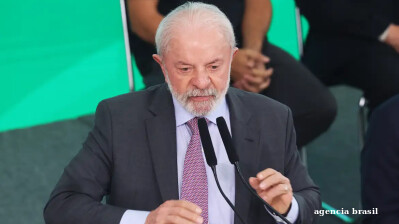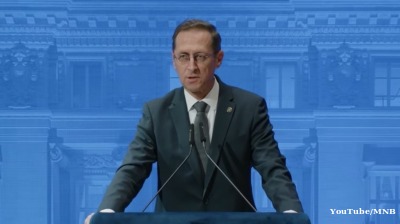Hungarian Prime Minister Viktor Orban faced a barrage of criticism at the European Parliament as he set out the goals of his rotating presidency of the European Union (EU). European lawmakers commented little on his proposals, and the session turned into a heated debate, dubbed by Hungary’s strongman a "political intifada".
Although the debate was originally intended to focus on the Hungarian rotating EU presidency's programme, much of the discussion centred on Orban’s national policies, particularly his challenge to the EU's values on democracy and migration.
The majority of the EP factions, the EPP, S&D, Renew Europe, the Greens and the far-left, all criticised Orban for issues related to corruption, the state of the rule of law in Hungary, and his foreign policy. Meanwhile, representatives from parties to the right of the political spectrum, including the Patriots for Europe (PfE), a group partly founded by the Hungarian leader, and the far-right Sovereign Nations of Europe (ESN), largely defended the Hungarian premier with sporadic ovations.
Orban began his address by saying the EU must change and that he was there to "sound a wake-up call". Presenting the Hungarian EU presidency's programme, he proposed adopting a new European competitiveness agreement, holding a series of Schengen summits to discuss migration and border protection, and admitting Bulgaria and Romania to the Schengen area this year.
Since the last Hungarian rotating presidency in 2011, the migration crisis "has reached a scale not seen since 2015" and threatened to tear the Schengen area apart, he warned. Hungary aims to be "the voice and catalyst of change" and it believes that competitiveness is the key element of change.
European Commission President Ursula von der Leyen, who left before the session ended, responded to the opening address by highlighting concerns about Hungary's commitment to the EU's values and policies.
The EC president took a firm stance against Orban’s opposition to supporting Ukraine in the war against Russia, saying, without naming Hungary’s leader, that there are still people who blame Ukraine for the war and not Russian leader Vladimir Putin. She then drew comparisons to Hungary's 1956 revolution and the Czech resistance to the 1968 Russian invasion.
"No European language equates peace with surrender and sovereignty with occupation," she noted. Von der Leyen accused Orban of engaging in "rogue diplomacy" with his unsanctioned visits to Kyiv, Moscow, and Beijing, calling his peace efforts a "propaganda show for autocrats".
She expressed concern that Hungary is moving away from the EU's unified stance, especially regarding its reliance on Russian fossil fuels.
Referring to Orban’s calls to bolster the EU’s competitiveness, she addressed the Hungarian people directly, stating, "We are one family, and your future is our shared future."
EPP president Manfred Weber also criticised Orban's recent diplomatic trips at the start of Hungary’s presidency and noted that his address failed to mention Ukraine even once. Weber expressed disbelief at how the Hungarian premier, once seen as a freedom fighter, could side with the aggressor in the conflict. He also highlighted Orban’s increasing isolation within the EU, saying that in 2011, Hungary was at the centre of Europe, but today no one wants to meet with the prime minister.
He took a highly politicised position telling the prime minister that EPP member the Hungarian Tisza Party, led by Peter Magyar, will defeat him. He is the future, he added.
Orban remained defiant in his responses. He said the EU must be protected from from the European left wing, "as they think democracy only exists as long as they win and ends as soon as the right wins".
He accused the EU of using its institutions as "political weapons" to target Hungary and claimed that the newly formed group of Hungarian-led MEPs, the Patriots for Europe, was being unfairly excluded from key roles in the European Parliament. He framed these exclusions as part of an orchestrated campaign by Brussels to silence nationalist and conservative voices.
News

Russia will remain defiant against US sanctions pressure, Putin claims
The sanctions come at a time when Russia’s two largest energy buyers, China and India, have shown signs of reducing their oil imports from Russia.

Russia rules out seizing EU assets but warns of retaliation if confiscations proceed
Russia will not seize European Union assets currently operating within its borders, Russian Deputy Finance Minister Alexei Moiseev has said.

China’s state-owned oil giants halt Russian crude purchases in response to US sanctions
China’s state-owned oil giants have paused their purchase of Russian crude oil in response to recent US sanctions targeting Moscow’s two largest oil firms, Rosneft and Lukoil

Switzerland reopens Baghdad embassy after 30-year closure
Switzerland reopened its Baghdad embassy after 30 years, with Iraqi and Swiss foreign ministers officiating ceremony reflecting confidence in Iraq's stability and signalling expanded economic cooperation.




